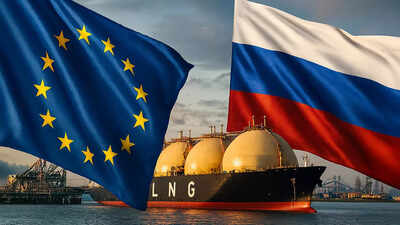Looking to pressurise Russia, the European Union is now looking to hasten its phaseout of Russian liquefied natural gas imports. The new plan aims to stop imports of Russia’s LNG ahead of its original 2027 deadline, following recent calls from US PresidentDonald Trumpfor stronger measures to limit Moscow’s energy trade.The Trump administration has been pushing European allies to accelerate their reduction of Russian fuel imports. Additionally, the US has been advocating for imposing substantial tariffs of up to 100% on India and China for their continued purchases of Russian oil.
The EU’s initial timeline had set the end of 2027 as the target date for completely eliminating Russian LNG imports, but the new measures could significantly advance this deadline.According to a Bloomberg report, the European Commission is considering including provisions in its upcoming sanctions package to expedite the elimination of Russian LNG imports before the end of 2027. The new sanctions proposal could be announced as early as Friday.The EU is also exploring the possibility of fast-tracking the Russian LNG phaseout through modifications to its RePowerEU plan, which was established to reduce dependency on Russian energy supplies.”Since we presented the RePowerEU plan in 2022, we’ve been saying that a phaseout of Russian energy is better sooner rather than later,” Commission Spokeswoman Anna-Kaisa Itkonen said.The EU is focusing on targeting Russian LNG instead of imposing tariffs on India and China, as many member states remain hesitant about broader sanctions, according to the Bloomberg report.The EU’s ability to phase out Russian gas is supported by an expected surplus in the global gas market by late 2024, which could help prevent supply shortages and price spikes in Europe.The United States has expressed strong interest in expanding LNG exports to Europe, with current EU imports from the US standing at approximately 50 billion cubic meters annually. Around twelve EU countries have LNG infrastructure in place.The recently signed EU-US trade deal includes a commitment from the EU to purchase $750 billion worth of US energy over the next three years, with increased LNG imports being a key component.Despite significant reductions in Russian gas flows to Europe following the 2022 Ukraine invasion, Russian supplies through Turkish pipelines and LNG shipments still constitute nearly 19% of total EU imports in 2024.Spain, Belgium, and France currently lead EU nations in Russian LNG imports.The EU’s approach includes two distinct pathways. While LNG sanctions require unanimous support from member states, RePowerEU plan proposals only need a qualified majority vote.”Spanish companies have increased substantially our purchases of LNG from the US, so somehow we’re getting away from Russia,” Spanish Economy Minister Carlos Cuerpo told Bloomberg Television. “It’s good that we have a specific calendar, and if we can push ahead more rapidly, then that’s good news as well.”A draft regulation for ending Russian LNG imports by 2027 is under review by the European Parliament and EU Council members, with both bodies able to suggest amendments.The RePowerEU measures would implement permanent changes, unlike sanctions package measures which could be reversed if sanctions on Russia are lifted.”Europe has made huge efforts and been very successful in reducing our reliance on Russian energy and Russian gas,” Paschal Donohoe, who leads the meetings of euro-area finance chiefs, told Bloomberg Television. “The Commission have indicated that they want to bring forward the proposal to further accelerate the reduced reliance we would have on Russian energy, and I know that efforts will be made to do that.”

